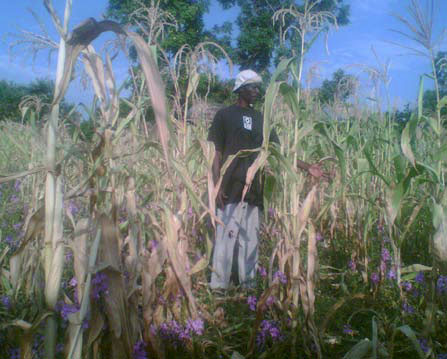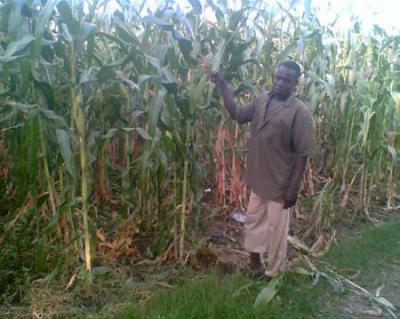Lwimi Suba Farmers Biochar Trial
- Log in to post comments
Peter Ongele, April, 2010
 Maize, no compost, no biochar |
 Maize with biochar and compost |
Declining soil fertility due to poor nutrient management is a major constraint to crop production in the Suba District, extending to other parts of the lake region of Western Kenya. Cover crops, mulches, compost or manure additions have been used successfully by few farmers, supplying nutrients to crops to support rapid nutrient cycling via microbial biomass. However, such benefits of soil amendments are short-lived to the small farmer (Jeckinson and Ayanaba 1977); and organic soil amendments must be applied annually to sustain soil productivity (Bol. Et al, 2000). The Suba District has not had defined soil management policies, as such, the Suba Farmers have taken the initiative via the Farmers Participatory Research Approach (FPRA) to research and trial Biochar farming practices. This helps the small farmers to understand farming methods, identify farming constraints, analyze soil fertility management options and evaluate Biochar technology in soil management. Over time, the goal is to identify the best options to address local limitations in soil management, and expand knowledge of additional local farming opportunities.
If FPRA can be easy adopted, it can be a gateway for greater involvement of small farmers in the Biochar technology evaluation and dissemination program. In turn, farmers will be easily empowered to overcome socio-economic constrains at the farm level, which currently limits the adoption of major soil management technologies. Fundamental goals of FPRA include: farmer evaluation to diagnose crop threats; respect for the capability of the individual farmer; produce and analyze knowledge; commitment by researchers to involve the community, and the recognition that research is an educational process for researchers and the community. FPRA also empowers or expands the farmersSports brands | Nike Shoes, Clothing & Accessories
